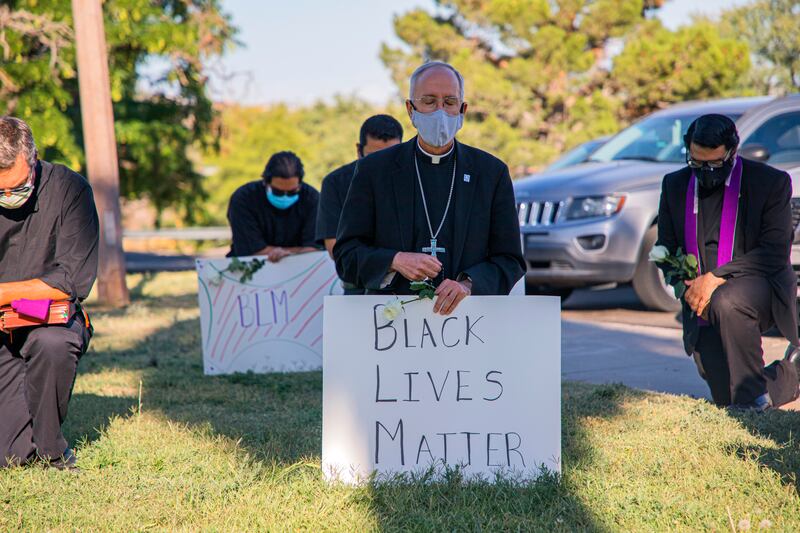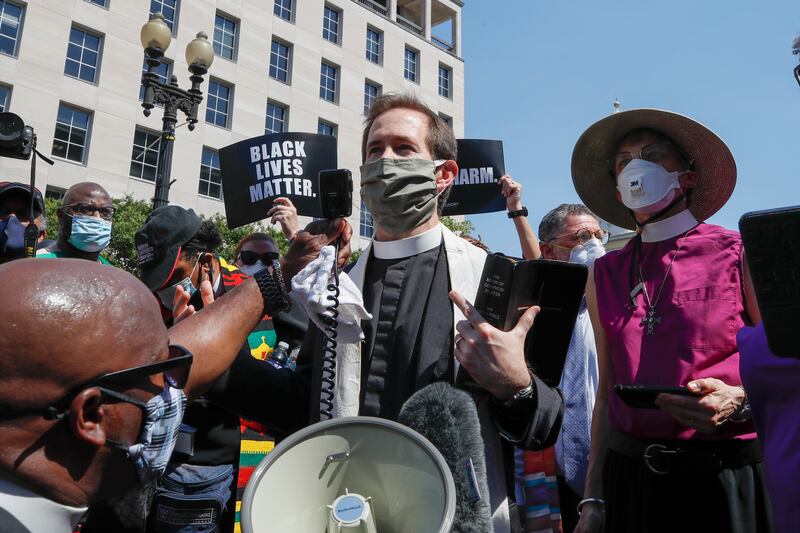SALT LAKE CITY — Across the country, support for the Black Lives Matter movement is surging, including in religious communities.
Episcopal leaders projected the phrase onto the front of Washington National Cathedral. Bishop Mark Seitz, who heads the Catholic diocese of El Paso, Texas, held a Black Lives Matter sign at a peaceful protest last week. J.D. Greear, president of the Southern Baptist Convention, called on Christians to embrace the statement Tuesday during a speech offered via Facebook Live.

“As a gospel issue, black lives matter. Of course, black lives matter. Our black brothers and sisters are made in the image of God.” Greear said.
On Monday, President Russell M. Nelson of The Church of Jesus Christ of Latter-day Saints reiterated his support for the black community in a column written with leaders from the NAACP.
“The wheels of justice should move fairly for all,” the group wrote.
From a historical perspective, these statements and actions are somewhat remarkable, according to scholars who study the relationship between personal faith and policing. For much of the past century, many Christians ignored or refuted reports of racial disparities in police work.
“For a long time within Christian circles, there have been African American Christians raising concerns. White Christians dismissed them as too liberal and too focused on politics,” said Aaron Griffith, author of the forthcoming book “God’s Law and Order: The Politics of Punishment in Evangelical America.”
Recent video recordings and social media posts have made the crisis of police brutality harder to ignore. But it remains unlikely that white Christians will lead the charge to reform police departments nationwide, scholars said.
“There are more white evangelical voices saying black lives matter. But are they also willing to say defund the police? I think a majority of Christians probably wouldn’t,” Griffith said.
Race vs. religion
The simplest explanation for why a white Christian would hesitate to call for broad police reform has more to do with race than religion, scholars said. White Americans, in general, are less likely than blacks to support calls for change, since they rarely experience race-based bias firsthand.
“For many white Christians, it’s just intuitive to tell your kids that policemen are here to help you,” said Griffith, who is an assistant professor of history at Sattler College in Boston.
More than 7 in 10 white evangelical Protestants (71%), white mainline Protestants (71%) and white Catholics (77%) believe police across the country are doing an “excellent” or “good” job protecting people from crime, according to Pew Research Center data provided to Christianity Today in 2017.
Fewer than half of black Protestants (45%) say the same.
“These data suggest that race is more strongly associated than religion in how people view the police,” said Rich Morin, a former Pew senior editor, to Christianity Today at the time.
However, religion does still matter, said Sam Perry, an associate professor of sociology at the University of Oklahoma. Just as white Americans are less likely to have negative interactions with law enforcement than blacks, Christians typically enjoy better treatment from police than members of other faith groups.
“If you’re blind to the fact that many social structures are set up to your advantage, you’re more tempted to defend police action and say society is fine,” Perry said.
Nearly half of evangelical Protestants (48.1%) “agree” or “strongly agree” with the statement that police officers in the United States treat blacks the same as whites, compared to 35% of adults overall, according to Baylor Religion Survey data provided to the Deseret News by political scientist Ryan Burge.
“If you’ve never had to overcome obstacles, it makes (complaints about the police) seem less legitimate,” Perry said.
Faith-driven support for police
In addition to improving a believer’s social status and, in turn, his interactions with police, Christianity can provide theological justifications for law enforcement’s work.
Christians are often taught that the world is naturally sinful, so it makes sense for them to support those trying to keep people in line, scholars said.
Some Christians claim order “doesn’t happen naturally. What you need are strong institutions, like families, churches, police officers and the military,” Perry said.
Christians also often believe that respecting secular authorities is a way to respect God. Biblical passages like Romans 13 urge believers to submit to decisions made by people in charge.
Romans 13 “has been used throughout the history of Christianity to justify any number of government practices, including even state violence,” Griffith said.
Through the lens of this passage and others, police brutality can seem justified if it serves the purpose of restoring order, Perry said. Christians typically think of police officers as good guys, so they’re OK with them using their guns.
“They’re in favor of good guy violence,” he said.
This is especially true for Christian fundamentalists, a term that refers to people who think the Bible is literally true. Worshippers who fit this description see God as an authoritarian figure and believe he wants police officers and other societal leaders to be the “authoritative arm of God” here on earth.
“Christian fundamentalists see no problem with the government exercising authority in ways that are violent,” Perry said.
These Christians are also more likely than others to emphasize biblical calls to bring wrongdoers to justice. In a forthcoming research study, Perry found that many white Christian fundamentalists prioritize punishing guilty citizens over protecting the innocent.
“The vast majority of Americans say it’s worse to convict the innocent. But if you’re white and a biblical literalist, you’re more likely than any other group to say it’s worse to let the guilty go free,” Perry said.
In general, Christians believe that efforts to monitor and then punish illegal behavior can serve a holy purpose. The Bible includes plenty of stories about God and others condemning those who are up to no good, Griffith said.
“Christians scriptures take offenses seriously and it’s clear that wrongs, when they are committed, should be addressed,” he said.
Black lives matter
The Bible also includes teachings on human dignity, grace and mercy, but, until recently, these passages were rarely brought up by Christians in regards to the police.
For decades, most white Christians seemed to focus so much on respecting authority figures that they overlooked the scriptures’ warnings about what happens when power is abused, Griffith said.
“Jesus was put to death by the state,” he said. “When we’re talking about criminal justice, about the legitimate use of state violence, we should be aware of that.”
As more Christians accept and even join the Black Lives Matter movement, he hopes religious communities will recognize the role they can play in bringing about thoughtful reforms. You can believe that police officers serve a holy purpose and still call for changes to the way they do their work, Griffith said.
“In Britain, they don’t arm most of their officers with guns. Does that mean the state has any less divine authority? I don’t think so. They’re hoping to achieve the same good in a different way,” he said.
But, for now, Griffith believes most white Christians won’t move beyond stating that black lives matter. When you’ve long thought of the police as a force for good, it’s difficult to begin speaking out, he said.


 alt=Kelsey Dallas
alt=Kelsey Dallas